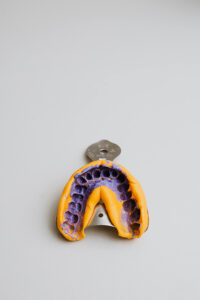The thought of dental implants might conjure images of needles, drills, and agonizing discomfort. But is this fear truly justified? While any medical procedure involves some level of sensitivity, the reality of dental implant placement is far more comforting than the myths surrounding it. Let's explore everything involved with dental implants, address your concerns head-on, and reveal the truth about pain management for dental implants.
The initial stage of your implant journey commences with a comfortable and informative meeting. Imagine yourself resting in the dentist's chair, embarking on a conversation about your unique smile goals and any concerns you might have.
Here, your active role takes center stage. Share your desired long-term vision, unveil your medical history, and let any lingering questions surface for discussion.
Your dentist, a dedicated partner in your implant journey, will diligently perform a thorough examination, meticulously utilizing X-rays or 3D scan technology to gain an insightful understanding of your overall mouth health and specific bone structure.
This stage signifies a true collaboration: a bespoke treatment plan, meticulously tailored to your individual needs and meticulously designed to deliver the smile you envision.
Throughout this process, expect transparency and comfort: pain-free examinations, detailed explanations of additional procedures, and the opportunity to have all your questions expertly answered. This initial stage empowers you to make informed decisions with complete confidence, leaving you in control of your implant journey.
This approach fosters a trusting and professional environment, sets the foundation for a successful experience, and solidifies the importance and ongoing process of open communication between patient and dentist.

It's completely understandable to feel apprehensive about any medical procedure, and dental implants might conjure images of needles and drills, raising concerns about pain. However, it's important to remember that modern dentistry prioritizes patient comfort, and several measures are in place to minimize any discomfort during the first dental implant surgery and placement stage.
The very first step in ensuring your comfort is administering local anesthesia to numb the area where the implant will be placed. This effectively blocks any pain signals, leaving you feeling comfortable and relaxed throughout the entire procedure.
While local anesthesia takes care of pain, some patients might still have anxiety about the procedure itself. To address this, your dentist can offer options like conscious sedation. This mild form of sedation helps you feel calm and relaxed while remaining awake and responsive. It's a great way to further ease any anxiety and ensure a comfortable experience.
Even with local anesthesia, you might experience some minor pressure or tugging sensations during the procedure. These are completely normal and don't signify pain. Modern techniques are designed to be minimally invasive, and your dentist will always communicate what you might feel, putting you at ease throughout the process.
Remember, throughout the entire procedure, your dentist will be by your side, constantly checking in to ensure your comfort and well-being. They will answer any questions you have and explain each step, minimizing any anxiety and ensuring you feel safe and cared for.

Natural Process: During osseointegration, when the implant and jawbone become one, it's like building a strong foundation for your new smile. This may lead to temporary soreness and swelling, but don't worry! It's just a temporary phase that can be managed easily with medication and ice packs. Remember, the reward is a permanent, pain-free solution that restores your smile's beauty and function.
Managing Discomfort: While some soreness and swelling are expected post-implant placement, similar to wisdom teeth removal, it's easily managed with medication and ice pack application. Most patients report minimal to no pain after the initial recovery period, and the long-term benefits of improved function and aesthetics far outweigh any temporary discomfort. So, take a deep breath, trust the expertise of your dentist, and embrace the journey towards a brighter, pain-free smile.
Healing Timeline: The initial soreness after your implant placement is similar to recovering from wisdom teeth removal, but the good news is that most discomfort fades within 3-5 days! While full healing takes several months for the implant to fully integrate with your jawbone, it's a smooth process with minimal lingering effects.
Dietary Adjustments: Following your implant surgery, you may have to switch to soft foods for a short time. This temporary switch is simply to support your healing and ensure a smooth recovery. Think creamy yogurts, fluffy scrambled eggs, and mashed sweet potatoes—all packed with nutrients and flavor. Anything that doesn't involve biting down or heavy chewing should be an acceptable substitute.
Importance of Rest: Following your dental implant placement, prioritizing rest is crucial for optimal healing. Think of it as giving your body the space and resources it needs to focus on effectively integrating the implant with your jawbone. Instead of strenuous activities, opt for gentle walks or quiet activities to allow your body to repair and rebuild.
Ensuring adequate sleep and rest further supports healthy healing, setting the stage for a smooth and comfortable recovery process. Remember, even though some temporary discomfort may be expected, prioritizing rest now leads to a stronger, healthier smile in the long run.
Crown Placement: This exciting final stage marks the culmination of your implant journey! Imagine sitting comfortably while your dentist painlessly attaches the final crown to the implant. This crown, perfectly matched to your natural teeth, restores both the function and aesthetics of your smile.
Say goodbye to gaps or chewing limitations, and hello to the freedom to effortlessly savor your favorite foods and flash a confident grin without restriction. It's a truly transformative moment, marking the beginning of a new era of enjoying a complete, healthy, and aesthetically pleasing smile.

Modern dentistry, and specifically our practice, prioritizes patient comfort by offering a spectrum of pain management strategies tailored to your individual needs.
Local Anesthesia: This fundamental technique remains the cornerstone of implant placement, effectively numbing the surgical area for minimal discomfort during the procedure.
Sedation: For additional relaxation and anxiety relief, we offer various options, including intravenous (IV) sedation administered by our experienced team. Unlike oral medication, IV sedation delivers a deeper level of relaxation and pain management, often leading to a state of drowsiness or light sleep. You may or may not remember the procedure. This option is particularly suitable for patients with significant anxiety or those undergoing more complex implant procedures.
Nitrous Oxide: Popularly known as laughing gas, this inhaled gas offers mild sedation and anxiety reduction, helping you feel calm and less anxious while remaining awake and responsive.
Pain Medication: Following your implant placement, your dentist will prescribe medication to manage any post-operative discomfort. We ensure you have clear instructions on dosage and duration for optimal pain management and a smooth recovery.
Remember, open communication is key. Discuss your concerns and preferences with our team to determine the most suitable pain management strategy for your unique needs. At our practice, your comfort and well-being are our top priorities throughout your dental implant journey.
The perceived fear of pain often deters individuals from exploring the life-changing benefits of dental implants. However, understanding the advancements in pain management and the minimal discomfort involved empowers you to make an informed decision. Consider these impactful benefits that await you:
Restored Functionality: Say goodbye to limitations imposed by missing teeth. Enjoy the freedom to chew your favorite foods without restriction, savor the textures, and experience the joy of effortless eating. Imagine confidently engaging in conversations without slurring and expressing yourself clearly and authentically. Dental implants restore not just your smile but also the functionality that enriches your daily life.
Natural Looking Teeth: Ditch the insecurities associated with gaps or dentures. Embrace a natural-looking, beautiful smile that radiates confidence. Imagine the transformation—a complete set of artificial teeth, that seamlessly blend with your natural ones, boosting your self-esteem and allowing you to smile freely and authentically. The aesthetic impact of dental implants goes beyond appearance; they empower you to embrace life with newfound confidence. Dental implants are an excellent solution to replace a missing tooth or multiple missing teeth.
Enhanced Oral Health: Missing teeth don't just affect your smile; they can compromise your overall oral health. Dental implants prevent bone loss, a common consequence of missing teeth, safeguard your jaw structure, and promote long-term oral health. The improved cleaning accessibility they offer reduces the risk of gum disease and other complications, contributing to a healthier mouth and a healthier you.
Durable Stability: Unlike temporary solutions like dentures, dental implants offer a permanent, stable solution. Imagine saying goodbye to the hassle and discomfort of adjustments or replacements. These high-quality implants feel and function just like natural teeth, providing long-lasting stability and peace of mind.
At Philadelphia Oral & Maxillofacial Surgery, we understand your concerns and prioritize your comfort throughout the implant journey. Dr. Cyndi Nguyen, a highly skilled and compassionate surgeon, utilizes the latest techniques and pain management strategies to ensure a smooth and comfortable experience. We believe in open communication and personalized care, addressing your individual needs and concerns every step of the way.
The type of implant and complexity of the procedure might slightly influence discomfort levels, but modern techniques and pain management strategies ensure minimal pain regardless. Whether you're receiving single implants, multiple implants, or undergoing bone grafting procedures, your comfort remains a top priority.
Some soreness and swelling are expected for a few days, but it's easily managed with medication and ice packs. Most patients report minimal to no pain after the initial recovery period of 3-5 days. Following your dentist's instructions diligently is crucial for a smooth and comfortable healing process.
Don't hesitate to contact your dentist immediately. They can assess the situation and adjust pain management strategies to ensure your comfort. Early communication is crucial to address any concerns and ensure a smooth recovery.